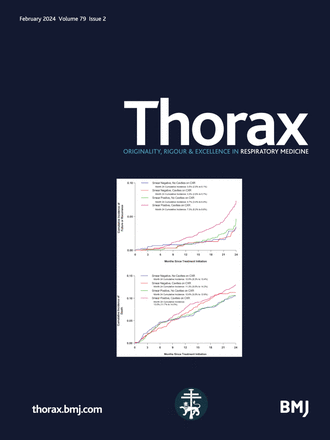Interferon gamma applied ex vivo restores function to neutrophils from critically ill patients
IF 7.7
1区 医学
Q1 RESPIRATORY SYSTEM
引用次数: 0
Abstract
Introduction Critically ill patients commonly develop acquired neutrophil dysfunction, which increases susceptibility to intensive care unit-acquired infection (ICU-AI). This study aimed to assess whether interferon gamma (IFN-γ) can restore function in dysfunctional neutrophils from critically ill patients and to uncover potential underlying mechanisms. Methods This was an observational cohort study. Neutrophils were isolated from whole blood donated by critically ill patients (n=31) in four separate teaching hospital intensive care units (ICUs). Neutrophils were subsequently treated with recombinant human IFN-γ or vehicle for 1 hour following either Fc gamma receptor (FcγR) blockade, selective inhibition of the gamma isoform of phosphoinositide 3-kinase (PI3K-γ) or vehicle control for 30 min. Neutrophil phagocytosis, bacterial killing, superoxide generation, phagocytic receptor expression and small Rho GTPase activity were assessed. Neutrophil dysfunction was defined as <50% of cells ingesting 2 or more zymosan particles in a phagocytosis assay. Results IFN-γ significantly improved phagocytosis (control 36.5%, IFN-γ 56.0%), bacterial killing (control 31.6%, IFN-γ 82.1%) and superoxide generation (2.8-fold increase relative to control) in dysfunctional neutrophils. IFN-γ also increased the activity of the small GTPases, Rac and Cdc42 (2.4-fold and 1.5-fold increase relative to control, respectively) in dysfunctional neutrophils. Selective inhibition of PI3K-γ prevented the IFN-γ-mediated improvement of phagocytosis (IFN-γ 62.5%, with inhibitor 27.9%), bacterial killing (IFN-γ 82.1%, with inhibitor 30.5%) and superoxide generation (IFN-γ 2.8-fold change relative to control, 0.7 with inhibitor). The IFN-γ-mediated improvement of bacterial killing in dysfunctional neutrophils was also prevented by FcγR blockade (IFN-γ 82.1%, FcγR inhibition 28.7%). Conclusions In critically ill patients with known acquired neutrophil dysfunction, ex vivo application of IFN-γ consistently improved a range of neutrophil effector functions. Data are available on reasonable request.体外应用干扰素可恢复危重病人中性粒细胞的功能
危重患者通常会出现获得性中性粒细胞功能障碍,这增加了对重症监护病房获得性感染(ICU-AI)的易感性。本研究旨在评估干扰素γ (IFN-γ)是否可以恢复危重患者功能失调的中性粒细胞的功能,并揭示潜在的潜在机制。方法采用观察性队列研究。从4个独立教学医院重症监护病房(icu)的31例危重患者全血中分离出中性粒细胞。中性粒细胞随后用重组人IFN-γ或载体处理1小时,阻断Fcγ受体(Fcγ r),选择性抑制磷酸肌肽3-激酶(PI3K-γ) γ亚型或载体对照30分钟。观察中性粒细胞吞噬、细菌杀灭、超氧化物生成、吞噬受体表达和小Rho GTPase活性。在吞噬试验中,中性粒细胞功能障碍定义为摄入2个或更多酶酶颗粒的细胞<50%。结果IFN-γ显著改善功能失调中性粒细胞的吞噬作用(对照组36.5%,IFN-γ 56.0%)、细菌杀灭(对照组31.6%,IFN-γ 82.1%)和超氧化物生成(相对于对照组增加2.8倍)。IFN-γ还增加了功能失调中性粒细胞中小gtpase、Rac和Cdc42的活性(相对于对照组分别增加2.4倍和1.5倍)。选择性抑制PI3K-γ阻止了IFN-γ介导的吞噬作用(IFN-γ 62.5%,抑制剂27.9%)、细菌杀灭(IFN-γ 82.1%,抑制剂30.5%)和超氧化物生成(IFN-γ相对于对照变化2.8倍,抑制剂0.7倍)的改善。IFN-γ介导的功能失调中性粒细胞细菌杀伤的改善也被FcγR阻断(IFN-γ 82.1%, FcγR抑制28.7%)所阻止。结论在已知获得性中性粒细胞功能障碍的危重患者中,体外应用IFN-γ持续改善一系列中性粒细胞效应功能。如有合理要求,可提供资料。
本文章由计算机程序翻译,如有差异,请以英文原文为准。
求助全文
约1分钟内获得全文
求助全文
来源期刊

Thorax
医学-呼吸系统
CiteScore
16.10
自引率
2.00%
发文量
197
审稿时长
1 months
期刊介绍:
Thorax stands as one of the premier respiratory medicine journals globally, featuring clinical and experimental research articles spanning respiratory medicine, pediatrics, immunology, pharmacology, pathology, and surgery. The journal's mission is to publish noteworthy advancements in scientific understanding that are poised to influence clinical practice significantly. This encompasses articles delving into basic and translational mechanisms applicable to clinical material, covering areas such as cell and molecular biology, genetics, epidemiology, and immunology.
 求助内容:
求助内容: 应助结果提醒方式:
应助结果提醒方式:


